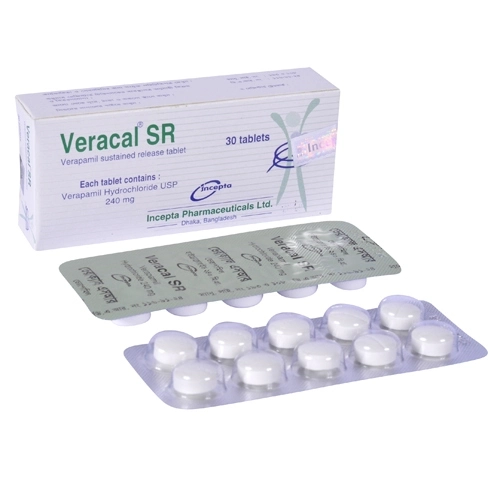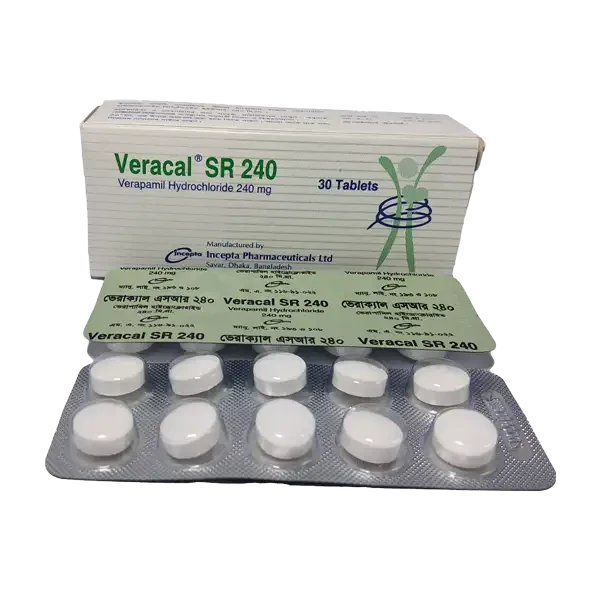Unit Price:
৳ 7.00
(3 x 10: ৳ 210.00)
Strip Price:
৳ 70.00
Also available as:
Indications
Veracal SR Tablet:
- Essential hypertension
- Angina pectoris and prevention of re-infarction
- Supraventricular arrhythmias
- Tachycardias such as: Paroxysmal supraventricular tachycardias
- Atrial fibrillation with rapid ventricular response (except WPWS)
- Atrial flutter with rapid conduction
- Extrasystoles
- Acute hypertension
- Acute coronary insufficiency
Description
Veracal SR is a calcium ion influx inhibitor that inhibits the inward movement of calcium into cardiomyocytes, smooth muscle cells and His-Purkingi system. The tablets are designed for sustained release of the drug in the intestine.
Pharmacology
Verapamil is an L-type calcium channel blocker with antiarrhythmic, antianginal, and antihypertensive activity. Immediate-release verapamil has a relatively short duration of action, requiring dosing 3 to 4 times daily, but extended-release formulations are available that allow for once-daily dosing. As verapamil is a negative inotropic medication (i.e. it decreases the strength of myocardial contraction), it should not be used in patients with severe left ventricular dysfunction or hypertrophic cardiomyopathy as the decrease in contractility caused by verapamil may increase the risk of exacerbating these pre-existing conditions.
Dosage & Administration
Verapamil Tablet:
- The dose of Verapamil should be individualized by titration and the drug should be administered with food.
- For essential hypertension the initial dose should be given 180 mg in the morning. If adequate response is not obtained with 180 mg of Verapamil then the dose may be titrated by following manner: 240 mg each morning. 180 mg each morning plus 180 mg each evening. 240 mg every 12 hourly.
- For angina the usual dose is 80 mg to 120 mg three times a day.
- For arrythmias in digitalized patients, Verapamil should be given 240 mg to 360 mg in divided doses, depending on the severity of the condition. Divided doses up to 180 mg/day may occasionally be needed.
Verapamil Injection:
Adults: 5 mg slowly intravenously, in tachycardias and hypertensive crises, if necessary repeat after 5 to 10 minutes. Drip infusion to maintain the therapeutic effect: 5-10 mg/hour in physiological saline, glucose, laevulose or similar solutions, on average up to a total dose of 100 mg/day.Children:
- Newborn: 0.75-1 mg (0.3-0.4 ml)
- Infants: 0.75-2 mg (0.3-0.8 ml)
- Children age 1-5 years: 2-3 mg (0.8-1.2 ml)
- Age 6-14 years: 2.5-5 mg (1-2 ml)
Interaction
May increase plasma level with CYP3A4 inhibitors (e.g. erythromycin, ritonavir), cimetidine. May decrease plasma level with CYP3A4 inducers (e.g. rifampicin), phenobarbital, sulfinpyrazone. Increased risk of bleeding with aspirin. May increase bradycardic and hypotensive effect with telithromycin. Increased AV blocking effect with clonidine. May increase plasma level of cardiac glycosides (e.g. digoxin, digitoxin), β-blockers (e.g. propranolol, metoprolol), α-blockers (e.g. terazosin, prazosin), immunosuppressants (e.g. sirolimus, ciclosporin, tacrolimus, everolimus), lipid lowering agents (e.g. lovastatin, simvastatin, atorvastatin), colchicines, quinidine, carbamazepine, imipramine, glibenclamide, doxorubicin, midazolam, buspirone, almotriptan, theophylline. May potentiate hypotensive effect with diuretics, antihypertensives, vasodilators. May increase neurotoxic effect of lithium.
Contraindications
- Severe left ventricular dysfunction
- Hypotension or cardiogenic shock
- Sick sinus syndrome (except in patients with a functioning artificial ventricular pacemaker)
- Second or third-degree atrioventricular (AV) block (except in patients with a functioning artificial pacemaker)
- Patients with atrial flutter or atrial fibrillation and an accessory by pass tract (eg. Wolff-Parkinson-White, Lown-Ganong-Levine syndrome)
- Patients with known hypersensitivity to verapamil hydrochloride
Side Effects
Veracal SR is generally well tolerated. The following reaction to orally administered Veracal SR appeared clearly drug-related or occurred at rates greater than 1% in clinical trials with approximately 5000 patients.
- Digestive system: Constipation, nausea;
- Cardiovascular system: Hypotension, edema, CHF, pulmonary edema, bradycardia, AV block;
- Respiratory system: Upper respiratory tract infections;
- Nervous system: Dizziness, headache, fatigue;
- Skin: Rash, flashing;
- Hepatic: Elevated liver enzyme.
Pregnancy & Lactation
There are no adequate and well-controlled studies in pregnant women, so this drug should be used during pregnancy only if clearly needed. Verapamil crosses the placental barrier and can be detected in umbilical vein blood during delivery. Verapamil is excreted in breast milk. So nursing should be discontinued while Verapamil is administered.
Precautions & Warnings
Care should be taken in 1st degree AV block, bradycardia <50 beats/minutes, hypotension <90 mm Hg systolic pressure, atrial fibrillation/flutter and simultaneous pre-excitation syndrome e.g. WPW syndrome, heart failure (previous compensation with cardiac glycosides/diuretics required). Veracal SR may impair ability to drive or operate machinery, particularly in the initial stages of treatment and with concomitant consumption of alcohol. Veracal SR markedly slows down the elimination of alcohol and prolongs the duration of the effects of alcohol.
Overdose Effects
Treatment of overdose should be supportive. Beta-adrenergic stimulation or parenteral administration of calcium solution may increase calcium ion flux across the slow channel and have been used in the treatment of overdose with Veracal SR. Veracal SR cannot be removed by hemodialysis.
Therapeutic Class
Calcium-channel blockers
Storage Conditions
Do not store above 30°C. Keep away from light and out of the reach of children.
Pack Images: Veracal SR 240 mg Tablet



